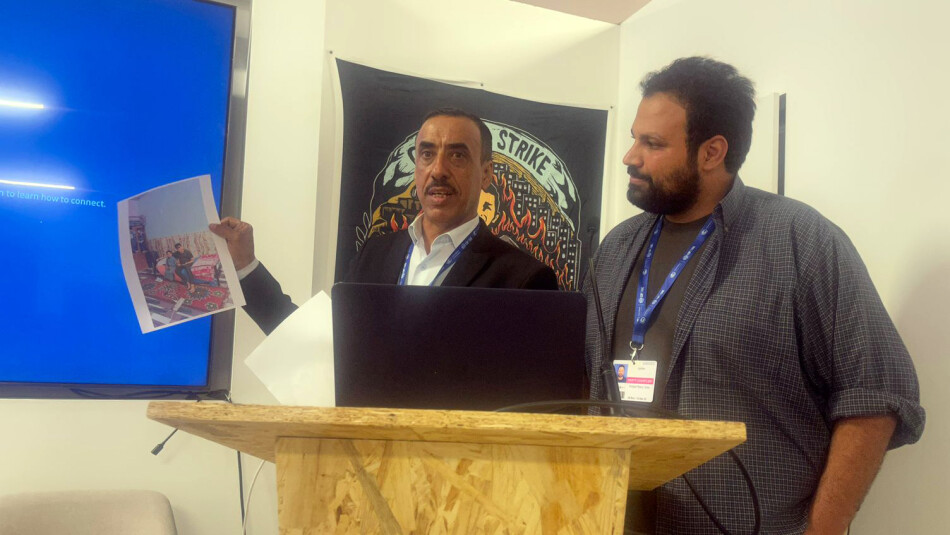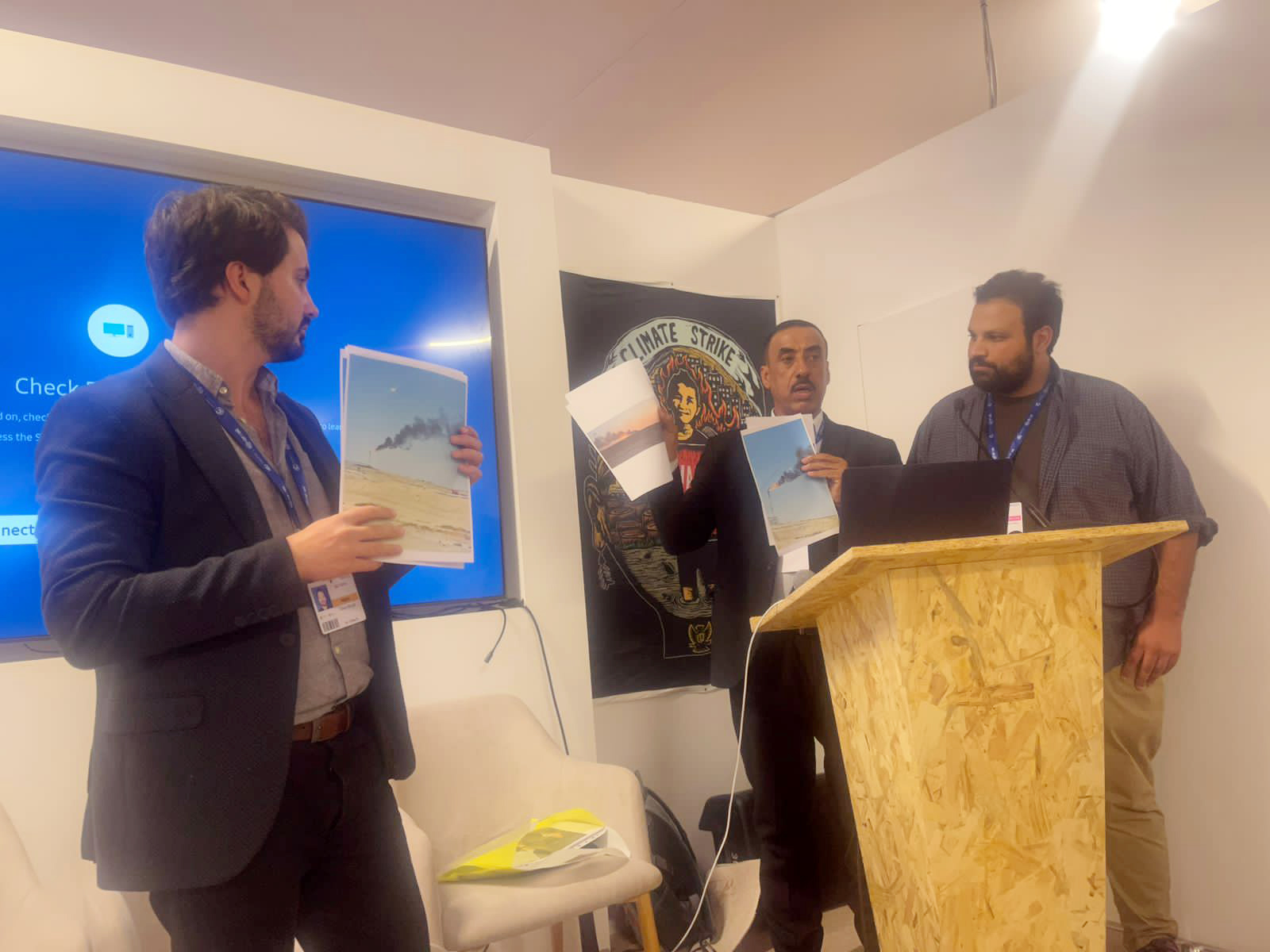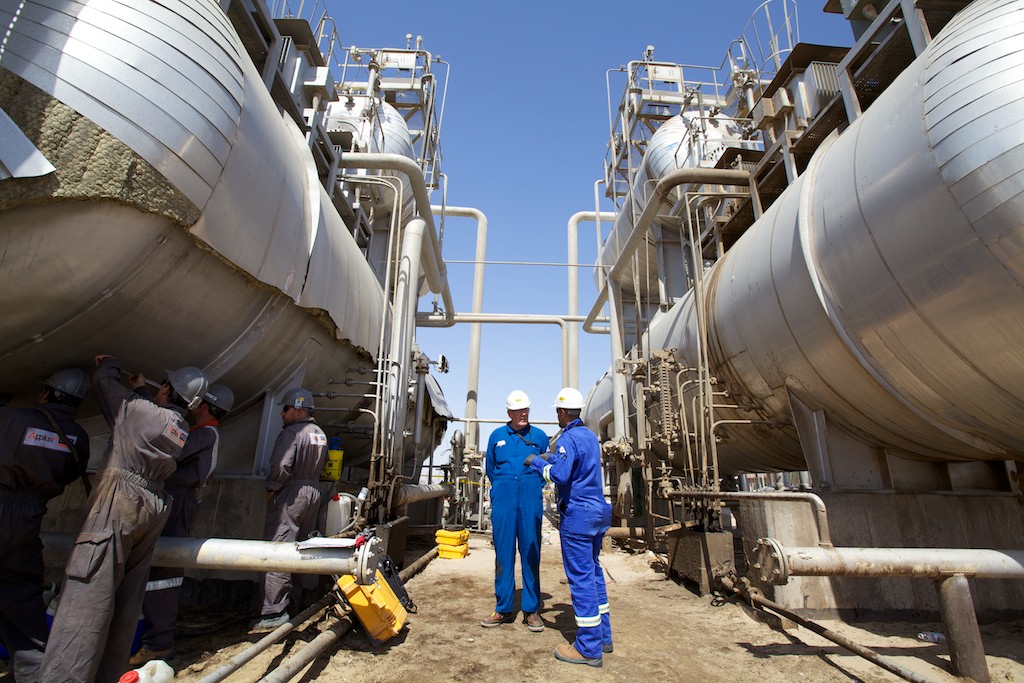
Hussein Jalloud was still clad in black, mourning his deceased son. His hands were trembling as he showed pictures showing the toxic gases emanating from the Rumaila oil field spreading overhead of the adjacent houses.
While highlighting the scenes of smoke associated with oil production in Basra, Jalloud holds up a picture of his son and says in front of a number of participants in the Climate Change Summit (COP28) held in Dubai, UAE, “This oil and the gases deprived me of my son>”
Ali Hussein Jalloud died a few months ago at the age of 21 due to leukemia. Hussein's house, where he lives with his wife and one of his children, is only 2,500 meters away from the Rumaila oil field.
“The main reason that Ali and many others in our region are afflicted with cancer is the burned gas emitted from the Rumaila field which causes air pollution,” Jalloud quoted the doctors who were treating his son.
Rumaila field is the largest oil field in Iraq in terms of production and the second largest oil field in the world, with a geographical area of more than 1,600 square kilometers, estimated to contain 17 billion barrels, which accounts for 12% of Iraq's oil reserves estimated at 143 billion barrels.
Located west of Basra Governorate in southern Iraq, the production capacity of Rumaila is 1.5 million barrels of oil per day, which constitutes almost half of the amount of oil that Iraq produces and exports daily.
In November 2023, approximately 102 million barrels of crude oil were exported from the oil fields in Basra alone, according to the latest statistics of the Ministry of Oil.
The rate of toxic gas emissions from the Rumaila field is three times that of any other oil field in the world
The British Broadcasting Channel BBC channel published in a documentary report that “the rate of toxic gas emissions from the Rumaila field is three times that of any other oil field in the world.”
A section of Basra's communities live next to the oil field, and many of them developed cancer from inhaling the toxic gases associated with oil production, and some of them died as a result, including Ali.
Ali was afflicted with leukemia at the age of 17 and suffered from pain and complications from the disease for four years. Ali’s father told KirkukNow, “Rumaila oil and gas for us is nothing more than cancer, because the financial condition of the region’s residents is deteriorating, and when they get cancer, they can’t afford paying for the treatment."
According to Hussein, they treat their patients in private hospitals and at their own expense. He says that his son received 12 treatment sessions over four years, each of which cost him more than a million Iraqi dinars IQD (USD750).

In Basra Governorate (population of more than three million and 200 thousand people), more than 2,000 cases of cancer are recorded annually due to burned gas associated with oil production, according to statistics from the Environmental Protection Department in the southern region published this year by the semi-official Iraqia News Agency.
Ali's story became part of an investigative report for the BBC entitled (Under Poisoned Skies), which investigates the causes of toxic pollution in the skies of Iraq and the dangers resulting from the gases associated with oil production, which affect the health and safety not only of residents residing near the oil field, but of millions live in neighbor areas.
The investigation took two years and six months to produce by a team with the assistance and participation of a number of Iraqi journalists.
Owen Pennell, a BBC journalist and author of the investigative report, told KirkukNow, “The conditions on the ground were worse than what I was seeing on my mobile screen. I can say that what I saw previously and what I witnessed on the ground were two very different things.”
This field (Rumaila) generates a lot of money for Iraq, but at the same time it brings many problems to the residents living nearby
Pennell believes that there are more similar stories in Rumaila that should be revealed. “This field (Rumaila) generates a lot of money for Iraq, but at the same time it brings many problems to the residents living nearby.”
He said that the biggest challenge they faced during the production of the investigation was Finding the party responsible for what is happening in Rumaila.
“The oil companies blame the government and the government blames the companies. In the end, we concluded that what is happening is a product of the way all parties work.”
According to a World Bank WB report, Iraq ranks second in the world in terms of burning gases associated with oil production at a rate exceeding 16 billion cubic meters annually. As a result, more than 400 tons of carbon dioxide are pumped into the air. In 2017, Baghdad joined a global initiative launched by the World Bank to stop burning gas by 2030.
3.5 million people die in the world annually due to the effects of toxic gases that pollute the air, according to statistics from the World Health Organization (WHO).

The BBC investigation was behind the production of another documentary called (Breathless), which was presented by the Climate Action Network as part of the COP28 activities in Dubai, which dealt with the harmful effects of toxic gases emanating from the Rumaila field on the health and safety of the residents of Kuwait.
Raising a picture of his son and crying, Ali’s father told those present at the documentary screening event, “I will never forget that night when my son died of cancer. Hours before his death, he said: My father, I dreamed of a very beautiful place. My son loved football and sports, but his dream did not come true.”
According to a study by the Iraqi Parliament on the spread of cancer in the period between 2003 and 2020, Basra Governorate came third with Sulaymaniyah in terms of the number of infections recorded in 2020, and the study stressed that there are two main reasons for the increase in cancer cases in Iraq, one of which is related to environmental pollution due to the burning of associated gases during oil production.
Ahmed Al-Droubi, an activist in the Climate Action Network, said that many countries argue they have the right to grow and prosper, and for that need to extract oil, “but what we see at the end of the story is that the wealth of the oil fields goes into the pockets of a certain group and not the citizens.”
The Climate Action Network is an international network that includes more than 1,300 non-governmental organizations NGOs working in 130 countries to reduce the effects of climate change. In the previous edition of the climate summit held in Egypt (COP27), the network presented a documentary about the story of Ali Hussein Jaloud. While he was still alive."
“At that time, Ali’s father spoke about the crime committed by companies against the environment and public health... By showing this production, we want to condemn that crime,” according to Al-Droubi.
In the middle of this year, the Iraqi Ministry of Oil launched the first phase of a project to invest in the gas associated with oil production and exploit it in various fields, as well as to stop the spread of 10 million tons of carbon dioxide in the air.
Jalloud pointed out that dozens of others in the region have contracted cancer due to environmental conditions. They may die at an early age, as happened to his son Ali.
“I came here to convey the real picture and what we, the residents of the Rumaila field, are suffering from. I want to tell the world that it is time to save us from this oil and gas.”
This story was produced as part of the 2023 Climate Change Media Partnership, a journalism fellowship organized by Internews' Earth Journalism Network and the Stanley Center for Peace and Security.